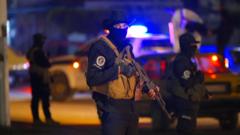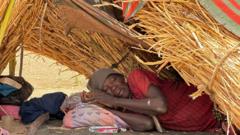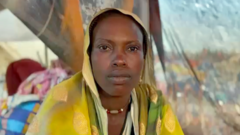Amidst ongoing sectarian conflict in Syria, an individual accused of participating in violence against Alawites asserts that he was guided by government security forces. This revelation is coupled with harrowing survivor testimonies detailing atrocities committed against civilians in the coastal region.**
Sectarian Violence in Syria: Eyewitness Accounts Claim Government Oversight of Civilian Killings**

Sectarian Violence in Syria: Eyewitness Accounts Claim Government Oversight of Civilian Killings**
A rare glimpse into the sectarian violence against Syria’s Alawite minority reveals chilling accounts from witnesses and an arrested participant claiming government forces facilitated attacks.**
Amid a backdrop of escalating sectarian violence, one man implicated in the recent killings of Syria's Alawite minority has provided alarming testimony to the BBC, suggesting direct involvement and oversight by government security forces. Abu Khalid, who traveled as a civilian fighter to the coastal village of Sanobar in March, claims he was guided by officials from the General Security department.
"They instructed us not to harm any civilians," he stated while confessing to participating in the fatal shooting of a local resident. This individual, Mahmoud Yusef Mohammed, was killed in front of his home during what Abu Khalid describes as a response to insurgent aggression. However, video evidence contradicts his narrative, sparking outrage and disbelief among human rights advocates.
According to human rights groups, nearly 900 civilians, mainly from the Alawite sect, lost their lives in a series of retaliatory strikes following attacks by former regime loyalists on government forces. This wave of violence coincided with sectarian tensions deepening within the country following the regime's change last December.
Reports depict a grim reality for many survivors in Sanobar, with accounts of armed groups executing Alawites under the chaotic guise of military actions. Witnesses recounted harrowing experiences of brutality, including the evacuation of families moments before planned attacks. The grief entailed no proper funerals, with mass graves marking the tragic losses.
As evidence of the government’s complicity and inability to section off civilians from combatants mounts, pressure intensifies on the new government's promise of justice and accountability. The Latakia security forces are now amid a critical juncture as they combat allegations of negligence or active participation in war crimes.
Ahmed al-Sharaa, the head of Syria's transitional government, has announced a dedicated committee to investigate acts of brutality, reaffirming that justice will prevail and no one will be exonerated due to their affiliations. Yet, as the country grapples with the lingering impact of past atrocities, many Alawite families demand better protection from government forces, wary of the factions positioned around their villages.
Sanobar, now a village steeped in sorrow and secrets, holds the key to understanding whether Syria’s new regime can foster unity and deliver justice instead of reheating old grievances submerged in sectarian strife. As tensions continue to simmer just below the surface, the region's minorities are keenly observing how these developments might shape their own futures.





















